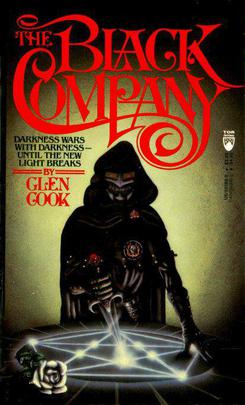 The Black Company Cover - reproduced under Fair Use
The Black Company Cover - reproduced under Fair Use
In the realm of fantasy literature, where dragons often hoard gold and knights in shining armor rescue damsels in distress, Glen Cook’s “The Black Company” emerges as a stark outlier. This novel, the first in a series that bears the same name, introduces us to a world that is as morally complex as it is dark. Through the eyes of its characters, Cook offers a narrative that diverges sharply from the traditional paths of high fantasy.
At the heart of “The Black Company” lies a world engulfed in perpetual conflict, where magic saturates the air and sorcerers wield unimaginable power. The magic system here is something of note - the rules are not clear and magic, and those who control it, are seen as almost god-like.
The Black Company itself is an entity steeped in history, known not just for its martial prowess but for a professionalism that borders on the existential - even if they are, at the time chronicled in the first book, significantly diminished.
It’s through this lens that we meet characters like Croaker, the company’s physician and annalist, whose dual role as healer and historian provides a unique and flawed perspective on the unfolding events.
I am reminded of the Mitchell and Webb sketch about SS soldiers asking “Are we the bad guys?”. The Black Company is working for the bad guys, fighting the Rebels in favour of the Lady’s Empire - all for a payday. However, throughout the book, we peak into the very nature of these types of conflict and see in inner machinations of Empire and the deals forged and morals left behind to ensure the larger goal of the Lady is achieved.
The narrative thrust of the book is propelled by the Company’s engagement with Soulcatcher, one of the enigmatic Taken who serves the Lady — a sorceress of immense power and questionable morality. As the Company aligns itself with the Lady, they find themselves embroiled in her battle against rebellious forces, setting the stage for a series of conflicts that test both their skills and their ethical boundaries.
What sets “The Black Company” apart is not just its setting or its plot, but its exploration of moral ambiguity. Characters in Cook’s world are not easily sorted into categories of good and evil; they operate in shades of gray, making choices that are often dictated more by survival than by any clear moral compass. This ambiguity extends to the Lady herself, whose quest for power is marked by both brutality and a strangely compelling sense of vulnerability.
The themes of loyalty and brotherhood are woven throughout, highlighting the bonds that hold the Company together despite the dubious nature of their employment. These themes are juxtaposed against a backdrop of power and corruption, illustrating how those with great abilities can become ensnared in their own desires for control.
Cook’s prose, as noted by many readers, adds another layer to the novel’s appeal. It’s unique — a style that captures the grit and grime of the Company’s world without sacrificing clarity or depth. This prose serves not just as a vehicle for storytelling but as a mirror reflecting the complex realities of Cook’s creation. Something as simple as the town names (like “Roses” and “Oar”) add a sense of connection to the real world while being completely different. This uncanny valley extends throughout this book and into the whole world.
“The Black Company” challenges our expectations of fantasy literature. It eschews the simplicity of traditional heroic narratives for a story that is richer, darker, and infinitely more complex. In doing so, it not only entertains but also invites us to ponder the nature of morality, loyalty, and power.
In this novel, Glen Cook has crafted a masterpiece that stands as a testament to the potential of fantasy literature to explore the depths of human experience. “The Black Company” is not just a book; it’s a journey into a world where shadows reign supreme, and where the light of moral certainty is a rare and fleeting thing.